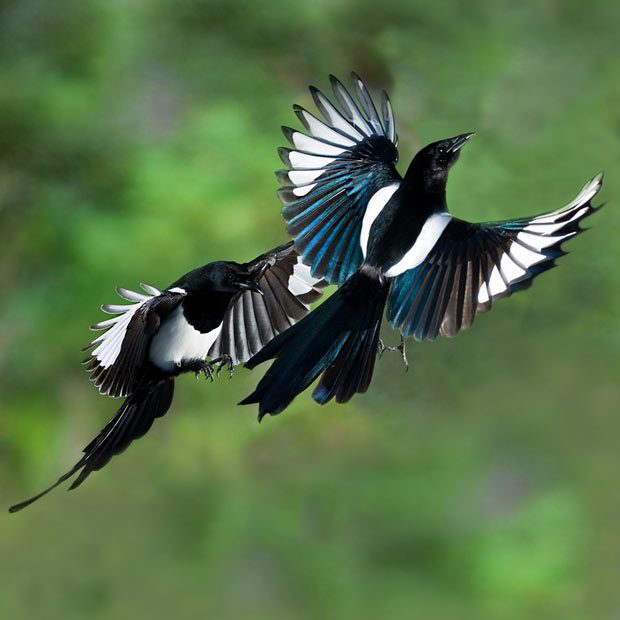Magpies, with their striking black-and-white plumage and lively behavior, have a deep cultural and symbolic meaning in Chinese culture. Known for their beauty and intelligence, magpies are often associated with positive meanings in Chinese folklore, traditions, and art. In this article, we will explore the symbolic significance of the magpie in Chinese culture, including its association with good luck, happiness, and love.

In Chinese culture, the magpie is primarily seen as a symbol of happiness and good fortune. This bird’s appearance is often linked to the arrival of positive events and favorable outcomes. The magpie's call is considered a harbinger of joy and good news, and its presence is believed to bring good luck to individuals and families.
One of the most well-known beliefs surrounding magpies in China is the idea that these birds bring good luck and prosperity. According to Chinese folklore, if a person hears the sound of a magpie’s song, it is seen as an omen of happiness or a sign that a positive change is about to occur. The phrase "喜鹊报喜" (xi que bao xi), meaning “magpies bring happiness,” is commonly used to describe this association.
In traditional Chinese beliefs, the magpie is seen as a bringer of good fortune, especially in relation to family and relationships. For example, a magpie’s appearance is sometimes considered a sign that a marriage proposal or reunion will be successful. This belief is closely tied to the bird's reputation as a symbol of joy and harmony.
The magpie's symbolism is frequently depicted in Chinese art and literature. Artists often paint magpies in combination with other symbols of good fortune, such as peonies or lotus flowers, to convey positive messages. The magpie’s association with happiness and prosperity makes it a popular subject in traditional Chinese paintings, especially during festive seasons like the Chinese New Year.
In Chinese paintings, the magpie is often depicted perched on a branch or in flight, symbolizing joyful occasions. These artworks are believed to bring good fortune to the home, and magpie motifs can be seen on scrolls, ceramics, and embroidered textiles. The magpie is also a popular symbol in Chinese New Year decorations, where it is often paired with images of lotus flowers or grapes to symbolize harmony and wealth.
The magpie also plays a significant role in Chinese poetry. In classical Chinese poetry, the bird is often used to symbolize love and longing. One of the most famous legends involving magpies is the story of "The Cowherd and the Weaver Girl" (牛郎织女), where magpies are said to form a bridge to reunite two star-crossed lovers, the Cowherd (牛郎) and the Weaver Girl (织女). This story is part of the Qixi Festival (七夕节), also known as the Chinese Valentine’s Day, where the magpie becomes a symbol of romantic love and reunion.
Another significant aspect of the magpie’s symbolism in Chinese culture is its association with love and romance. The magpie’s monogamous nature, where pairs mate for life, makes it a symbol of fidelity, loyalty, and lasting love. As a result, magpies are often used in wedding ceremonies and marriage-related symbolism in China.
The Qixi Festival (七夕节), often called Chinese Valentine's Day, has a deep connection to magpies. According to the popular legend of the Cowherd and the Weaver Girl, two lovers who are separated by the Milky Way, magpies create a bridge across the sky so the lovers can reunite once a year on the seventh day of the seventh month of the lunar calendar. During this festival, magpies are seen as a symbol of true love, reunion, and romantic harmony.
In this context, the magpie represents not only the hope for love but also the idea of eternal togetherness. It is often depicted in stories and decorations associated with romantic relationships, symbolizing fidelity and devotion between couples.
In traditional Chinese superstition, magpies are considered a lucky omen. The sight of a magpie is believed to bring good news, and many people associate magpies with the arrival of auspicious events or favorable circumstances. For example, it is said that if someone sees a magpie singing on a roof, it is a sign that good news is on its way, particularly in matters related to family or career.
Good Omen: Hearing a magpie sing is seen as a positive sign, often indicating good news or a happy event.
Positive Energy: The appearance of a magpie is considered a symbol of positive energy and new beginnings.
Fortune and Prosperity: In some regions, people believe that magpies bring wealth, harmony, and prosperity to households, making them a popular symbol in homes and businesses.
In conclusion, the magpie in Chinese culture is more than just a bird; it is a symbol of good luck, happiness, and love. With its deep cultural significance, the magpie is revered in Chinese folklore, art, literature, and superstitions. Whether as a bringer of joyful tidings, a symbol of eternal love, or a harbinger of prosperity, the magpie holds a cherished place in Chinese tradition and continues to inspire people with its positive symbolism.
The Role of Animals in Chinese Culture: Symbols and Beliefs
Understanding Chinese Superstitions and Lucky Symbols
Magpie and the Cowherd and Weaver Girl: The Legend of Qixi Festival
animal tags: magpie
We created this article in conjunction with AI technology, then made sure it was fact-checked and edited by a Animals Top editor.